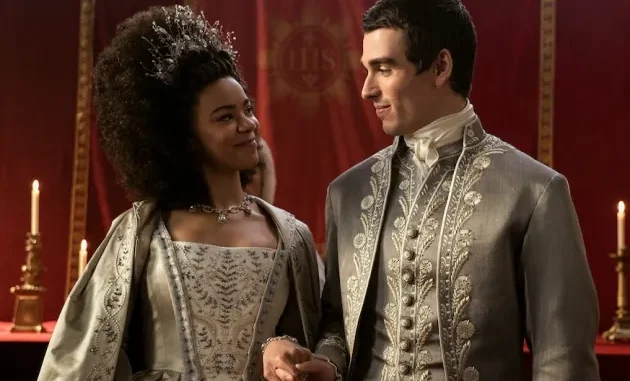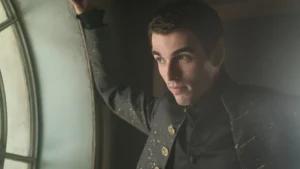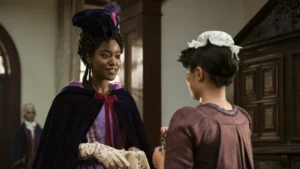
“Queen Charlotte” may be an extension of the “Bridgerton” universe, but its brand-new story by Shonda Rhimes is quite different, with a much more serious tone.
“The series in itself is like a different beast,” says Corey Mylchreest, who portrays young King George III in the Netflix drama. “It feels like ‘Bridgerton’ but it has maybe darker moments to it, and it’s a little bit grittier. So it feels like its own thing.”
The story of Queen Charlotte and King George III was briefly touched on in Season 2 of “Bridgerton,” but this prequel dives in to the origin story of a young Charlotte (India Amarteifio) as she embarks on her arranged marriage to a young King George. Charlotte’s fearlessness — especially as a Black woman marrying the King of England — changes the country, under the auspices of what the show calls “The Great Experiment.”
Meanwhile, her husband spends most of his time in hiding due to an unidentified mental illness. In real life, King George III was never specifically diagnosed. He suffers from manic symptoms including hallucinations and both physical and emotional pain.
“As a show, we don’t diagnose him, but as an actor, I simply had to make a decision. Otherwise, the work is going to be nonspecific, and it can be offensive. I did a lot of research and I had an idea of what it was, learning about his childhood and how that can affect stuff,” says Mylchreest.
He worked closely with director Tom Verica, and spoke with a specialist about George’s affliction — about what triggers certain behavior, when and why.
“It’s a gift as an actor, because it’s such a challenge but it doesn’t afford you anything other than permission to go 100%. If you don’t commit fully, then you’re going to almost offend the honor of the character — both that Shonda has written, and the real guy that I fell in love with when I did my research,” Mylchreest says. “It’s a man who is dealing with the subsequent shame and self-hatred that comes as a result of that affliction.”

As in any “Bridgerton” series, the love story is at the center — so the chemistry between the leads is a must. And yes, that means sex scenes. For Mylchreest and Amarteifio, creating that was an easy part as their character’s closeness changed as the show went on. At first, they only had sex on even days, strictly to try to create an heir. As they continue, their physical closeness develops into real intimacy and love.
“I don’t think it would be a very good show, but even if it was just the intimate scenes between George and Charlotte, you would have a story. You’d have an arc; you’d have a beginning, middle and end,” says Mylchreest, thanking intimacy coordinators Lucy Fennell and Lizzie Talbot. “‘Bridgerton,’ in the past, has been has been criticized for having those intimate scenes gratuitously. Something that we’re really proud of is that it’s not the case here at all.”
Still, “it was very nerve-racking,” he says. “I also realize that I’m saying that as a man on a set with a male director, and I’m feeling nervous, so you know that that speaks to the environment — or the maybe the stigma around it at the moment. India was so brilliant, and I think we built such as such a sense of trust that it had its own arc for us in a way.
“The first one was a real nerve-racking experience, and by the end of it, it was like, ‘Let’s crack this one out!’ It was very easy.”
Amarteifio echoed Mylchrees’ sentiments, noting that not only were they comfortable in the scenes, but also felt secure enough to have discussions about the specifics that might have been uncomfortable.
“They created such a safe space and making us feel as if we actually had a say in some of these scenes. You walk into a room sometimes, and it’s one thing to say, ‘Yeah, you can you can speak freely.’ It’s another thing of actually feeling that,” says Amarteifio. “Everything is in there for a reason. It’s a testament to our team and to Shonda, everyone being just genuine, lovely people and remembering that this is a show and it’s for storyline. We don’t put things in just for the sake of it.”

Young Agatha Danbury (Arsema Thomas) had a powerful — and unique — journey of her own over the course of the season, first in a marriage in which she’s strictly performing her wifely duty, and then eventually having an affair that allows her to find her own sexual awakening. For Thomas, the preparation took around six months.
“The greatest thing to recognize was that Agatha is not a stagnant person. Over the course of every episode, she changes her mind and her point of view. She becomes more self-aware,” says Thomas, who read dozens of books about Black women finding their power, and spoke with women in her family about the arc before filming began.